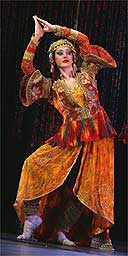 By Tom Perry, BEIRUT (Reuters Life!) – Lebanon’s Caracalla Dance Theatre defied the odds to bring its fusion of modern and oriental dance to stages at home and abroad, building one of the Arab world’s great artistic success stories. But having survived Lebanon’s 1975-1990 civil war, Caracalla has been suffering its toughest spell in nearly four decades of dance, says company founder Abdel-Halim Caracalla.
By Tom Perry, BEIRUT (Reuters Life!) – Lebanon’s Caracalla Dance Theatre defied the odds to bring its fusion of modern and oriental dance to stages at home and abroad, building one of the Arab world’s great artistic success stories. But having survived Lebanon’s 1975-1990 civil war, Caracalla has been suffering its toughest spell in nearly four decades of dance, says company founder Abdel-Halim Caracalla.
The company has been forced to postpone its home performance plans for three years in a row because of political turmoil, war and assassinations, losing its biggest box office. It plans to take to the stage in December in Lebanon for the first time since 2002."These days are harder on us than the war days," said Caracalla, who led his dancers across the front lines of the civil war to perform throughout the divided country. "It was dangerous, but all the fighting factions accepted Caracalla."
Now, with his country paralyzed by political crisis, Caracalla says returning to the Lebanon stage is vital for the survival of a company whose ground-breaking choreography has impressed critics around the world."The biggest audience for Caracalla is in Lebanon. They are waiting. We are waiting," he said, sipping an espresso after overseeing rehearsals at the company’s home theatre in Beirut.
"We are dying … the company has never not performed for five years."
WAITING FOR BAALBEK
Caracalla has yet to perform one of its most recently produced ballets, "The Villagers’ Opera," because of the repeated cancellation of the Baalbek Festival — traditionally the launch pad for the company’s productions.
Designed to mark the 50th anniversary of the Baalbek Festival in 2005, "The Villagers’ Opera" tells a folkloric tale of quarrels in a Lebanese village.
"This represented the situation in the country," said Ivan Caracalla, son of Abdel-Halim and the company’s director. "To have reconciliation, you have to have courage and heart. This is the theme of the production."
Plans to stage the show this year at Baalbek, Caracalla’s home town, were thwarted once again when the festival was cancelled because of the country’s internal problems.
"Now we are waiting until 2008," Ivan Caracalla said. "We are looking forward to going back to Baalbek because the festival is a sign that Lebanon is back on its feet."
While saving "The Villagers’ Opera" for Baalbek, Caracalla’s dancers are rehearsing for "Knights of the Moon," a production which the company hopes to perform in Lebanon in December.
THE CARACALLA STYLE
"I underline hopefully," said Ivan Caracalla, wary of the country’s political problems. The show will then go on a world tour in 2008.
Commissioned by the Qatar Foundation and staged in the Gulf country in March, "Knights of the Moon" reflects Arab tradition in its story, music, costumes, set design and choreography.
Like other Caracalla productions, the choreography is based on the modern style developed by American dancer Martha Graham — a 20th century pioneer of contemporary dance.
"This is really the base form of the Caracalla dancers," explained Ivan Caracalla. "Upon that is added the movement of the eastern body — the movement of the hips, the elbows, the arms, the hands.
"This fusion is what is called the Caracalla style."
The blend of influences in both dance and music explains why Caracalla has enjoyed such success abroad with productions dating back to the early 1970s. "Caracalla has a way of knowing how to invite the West to look at oriental heritage," he said.
Caracalla has also struck a chord in the Middle East, winning patrons including the late King Hussein of Jordan and others who have viewed the company as an ambassador for their region.
The company remains the only dance theatre in the Arab world and has 900 students who train at its Beirut theatre.
"People in the Middle East don’t only view Caracalla as a Lebanese entity but something that can uphold Arab tradition," Ivan Caracalla said.
(Editing by Paul Casciato)



